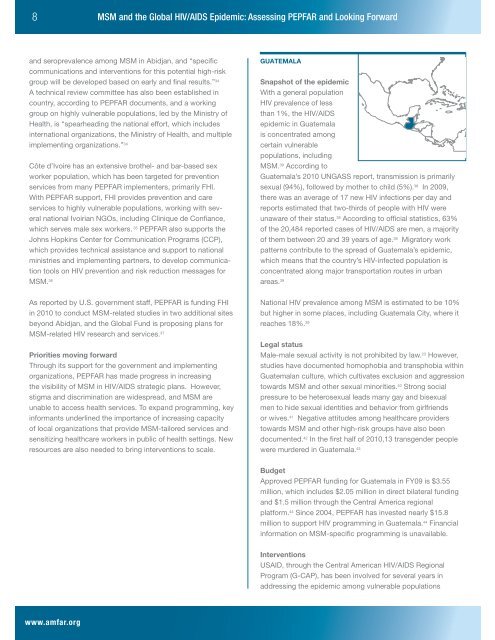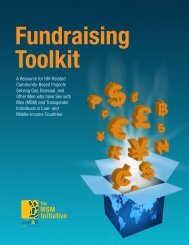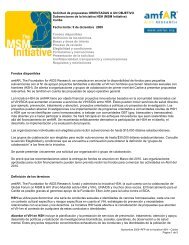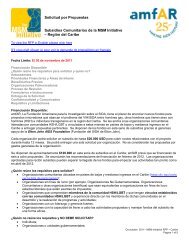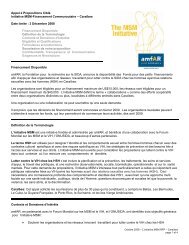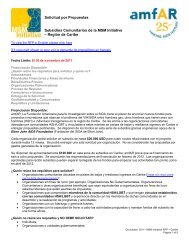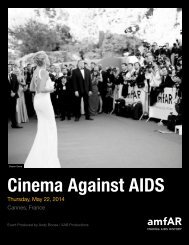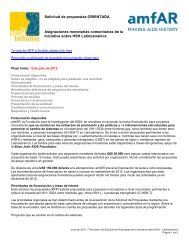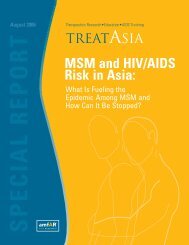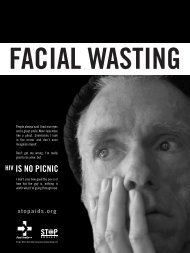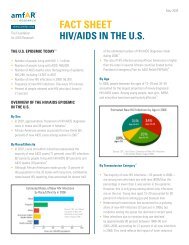Issue Brief: MSM and the Global HIV/AIDS Epidemic - amfAR
Issue Brief: MSM and the Global HIV/AIDS Epidemic - amfAR
Issue Brief: MSM and the Global HIV/AIDS Epidemic - amfAR
You also want an ePaper? Increase the reach of your titles
YUMPU automatically turns print PDFs into web optimized ePapers that Google loves.
8<br />
<strong>MSM</strong> <strong>and</strong> <strong>the</strong> <strong>Global</strong> <strong>HIV</strong>/<strong>AIDS</strong> <strong>Epidemic</strong>: Assessing PEPFAR <strong>and</strong> Looking Forward<br />
<strong>and</strong> seroprevalence among <strong>MSM</strong> in Abidjan, <strong>and</strong> “specific<br />
communications <strong>and</strong> interventions for this potential high-risk<br />
group will be developed based on early <strong>and</strong> final results.” 34<br />
A technical review committee has also been established in<br />
country, according to PEPFAR documents, <strong>and</strong> a working<br />
group on highly vulnerable populations, led by <strong>the</strong> Ministry of<br />
Health, is “spearheading <strong>the</strong> national effort, which includes<br />
international organizations, <strong>the</strong> Ministry of Health, <strong>and</strong> multiple<br />
implementing organizations.” 34<br />
Côte d’Ivoire has an extensive bro<strong>the</strong>l- <strong>and</strong> bar-based sex<br />
worker population, which has been targeted for prevention<br />
services from many PEPFAR implementers, primarily FHI.<br />
With PEPFAR support, FHI provides prevention <strong>and</strong> care<br />
services to highly vulnerable populations, working with several<br />
national Ivoirian NGOs, including Clinique de Confiance,<br />
which serves male sex workers. 35 PEPFAR also supports <strong>the</strong><br />
Johns Hopkins Center for Communication Programs (CCP),<br />
which provides technical assistance <strong>and</strong> support to national<br />
ministries <strong>and</strong> implementing partners, to develop communication<br />
tools on <strong>HIV</strong> prevention <strong>and</strong> risk reduction messages for<br />
<strong>MSM</strong>. 36<br />
As reported by U.S. government staff, PEPFAR is funding FHI<br />
in 2010 to conduct <strong>MSM</strong>-related studies in two additional sites<br />
beyond Abidjan, <strong>and</strong> <strong>the</strong> <strong>Global</strong> Fund is proposing plans for<br />
<strong>MSM</strong>-related <strong>HIV</strong> research <strong>and</strong> services. 37<br />
Priorities moving forward<br />
Through its support for <strong>the</strong> government <strong>and</strong> implementing<br />
organizations, PEPFAR has made progress in increasing<br />
<strong>the</strong> visibility of <strong>MSM</strong> in <strong>HIV</strong>/<strong>AIDS</strong> strategic plans. However,<br />
stigma <strong>and</strong> discrimination are widespread, <strong>and</strong> <strong>MSM</strong> are<br />
unable to access health services. To exp<strong>and</strong> programming, key<br />
informants underlined <strong>the</strong> importance of increasing capacity<br />
of local organizations that provide <strong>MSM</strong>-tailored services <strong>and</strong><br />
sensitizing healthcare workers in public of health settings. New<br />
resources are also needed to bring interventions to scale.<br />
GUATEMALA<br />
Snapshot of <strong>the</strong> epidemic<br />
With a general population<br />
<strong>HIV</strong> prevalence of less<br />
than 1%, <strong>the</strong> <strong>HIV</strong>/<strong>AIDS</strong><br />
epidemic in Guatemala<br />
is concentrated among<br />
certain vulnerable<br />
populations, including<br />
<strong>MSM</strong>. 39 According to<br />
Guatemala’s 2010 UNGASS report, transmission is primarily<br />
sexual (94%), followed by mo<strong>the</strong>r to child (5%). 38 In 2009,<br />
<strong>the</strong>re was an average of 17 new <strong>HIV</strong> infections per day <strong>and</strong><br />
reports estimated that two-thirds of people with <strong>HIV</strong> were<br />
unaware of <strong>the</strong>ir status. 38 According to official statistics, 63%<br />
of <strong>the</strong> 20,484 reported cases of <strong>HIV</strong>/<strong>AIDS</strong> are men, a majority<br />
of <strong>the</strong>m between 20 <strong>and</strong> 39 years of age. 38 Migratory work<br />
patterns contribute to <strong>the</strong> spread of Guatemala’s epidemic,<br />
which means that <strong>the</strong> country’s <strong>HIV</strong>-infected population is<br />
concentrated along major transportation routes in urban<br />
areas. 39<br />
National <strong>HIV</strong> prevalence among <strong>MSM</strong> is estimated to be 10%<br />
but higher in some places, including Guatemala City, where it<br />
reaches 18%. 39<br />
Legal status<br />
Male-male sexual activity is not prohibited by law. 23 However,<br />
studies have documented homophobia <strong>and</strong> transphobia within<br />
Guatemalan culture, which cultivates exclusion <strong>and</strong> aggression<br />
towards <strong>MSM</strong> <strong>and</strong> o<strong>the</strong>r sexual minorities. 40 Strong social<br />
pressure to be heterosexual leads many gay <strong>and</strong> bisexual<br />
men to hide sexual identities <strong>and</strong> behavior from girlfriends<br />
or wives. 41 Negative attitudes among healthcare providers<br />
towards <strong>MSM</strong> <strong>and</strong> o<strong>the</strong>r high-risk groups have also been<br />
documented. 42 In <strong>the</strong> first half of 2010,13 transgender people<br />
were murdered in Guatemala. 43<br />
Budget<br />
Approved PEPFAR funding for Guatemala in FY09 is $3.55<br />
million, which includes $2.05 million in direct bilateral funding<br />
<strong>and</strong> $1.5 million through <strong>the</strong> Central America regional<br />
platform. 44 Since 2004, PEPFAR has invested nearly $15.8<br />
million to support <strong>HIV</strong> programming in Guatemala. 44 Financial<br />
information on <strong>MSM</strong>-specific programming is unavailable.<br />
Interventions<br />
USAID, through <strong>the</strong> Central American <strong>HIV</strong>/<strong>AIDS</strong> Regional<br />
Program (G-CAP), has been involved for several years in<br />
addressing <strong>the</strong> epidemic among vulnerable populations<br />
www.amfar.org


